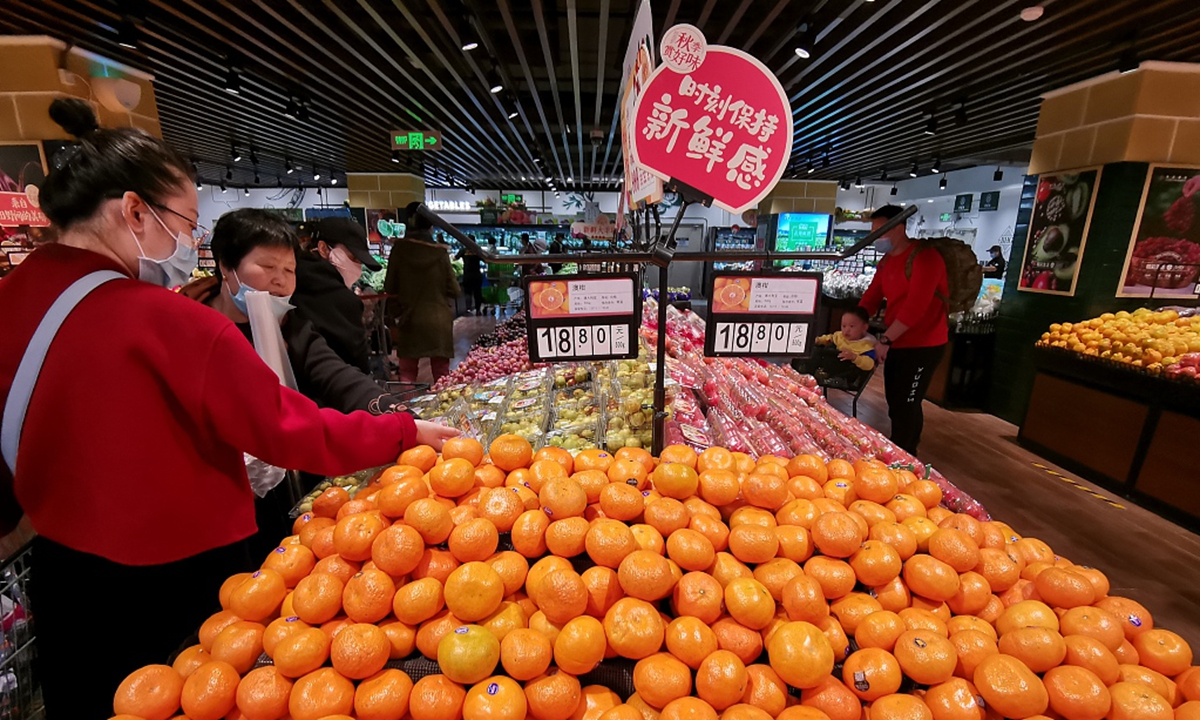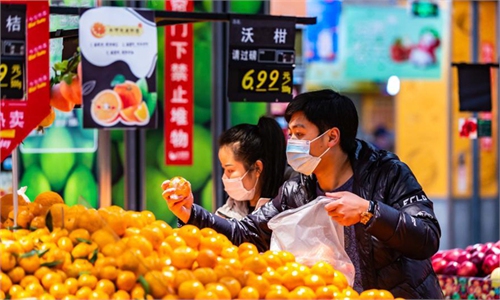
CPI Photo: VCG
China's consumer price index (CPI), a main gauge of inflation, rose by its fastest annual pace in a year in June amid the volatile global energy costs and low base effect, according to official data released by the National Bureau of Statistics (NBS) on Saturday.
China's June CPI rose 2.5 percent year-on-year, expanding from 2.1 percent in May, but was unchanged month-on-month, NBS data showed on Saturday.
China's inflation, though still generally moderate, still faces continued upward pressure due to domestic and international factors, which may request government to take more measures in the future to stabilize prices and ensure supplies, experts noted.
The increase on a year-on-year basis was mainly due to the low base effect. Food prices rose 2.9 percent year-on-year in June, contributing about 0.51 percentage points to the CPI increase, while non-food prices gained 2.5 percent, contributing about 2.01 percentage points to the CPI increase, according to Dong Lijuan, a statistician at the NBS.
In particular, gasoline prices and diesel prices surged 33.4 percent and 36.3 percent from a year earlier, NBS data showed.
Meanwhile, the producer price index (PPI), a main gauge of factory price, continued to moderate in June for an eighth straight month. The PPI increased 6.1 percent from a year earlier, lower than the 6.4-percent rise in May.
China's PPI once surged to a record high of 13.5 percent in October 2021 before moderating in the following months.
Experts said China's inflation is generally controllable, but is still facing upward pressure.
While the PPI growth showed a declining trend, the cost pressure from the relatively high PPI in recent months may pass down to the CPI in the long run, Cong Yi, a professor at Tianjin University of Finance and Economics, told the Global Times on Saturday. And adequate monetary policy easing is also likely to be a driving force for CPI increase in the near future.
Moreover, due to the sporadic outbreaks across the country, domestic economic activities haven't completely returned to normalcy judging from the various economic indicators, suggesting that there could still be a certain shortage or insufficient supplies, and this may lead to some room for the CPI to rise further, Xi Junyang, a professor at Shanghai University of Finance and Economics, told the Global Times on Saturday.
Xi believes that the current CPI growth is relatively high compared with the past when CPI growth was generally below 2 percent, but given the inflation target of around 3 percent for this year, such inflationary pressure is still controllable.
Considering that higher inflation will squeeze the room for monetary easing, the government may roll out some measures to curb its rise, Xi noted.
What is important about manageable inflation is that it represents adequate room for macroeconomic policy adjustment. After being hit by the worst COVID-19 flare-up in two years in the first half of this year, the Chinese economy in the second half needs proper policy stimulus to stabilize its growth within a reasonable range, Cong noted.
At present, inflation is soaring in many major economies. In May, US CPI rose 8.6 percent, while UK inflation rose 9.1 percent, both hitting the highest levels in about four decades. In comparison, China's CPI has been at a generally reasonable level.
One of the main reasons for the inflation difference between China and other major economies is that China's production and supply chains are more resilient than others, which, to a certain extent, increases the stability of the Chinese economy, Cong explained. This is why despite the upward trend, there are also factors to offset the inflationary pressure.
For instance, the tax and fee reduction program will help ease the cost pressure of the supply chain, and with the recent correction in bulk commodity prices, PPI growth is likely to decline further, according to Cong.

